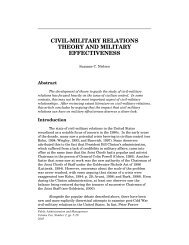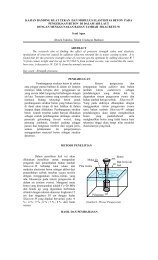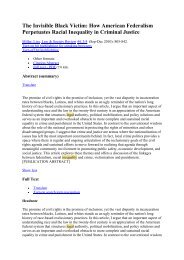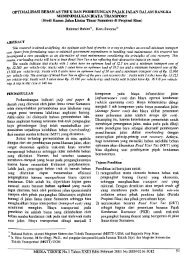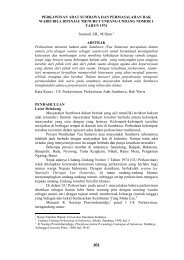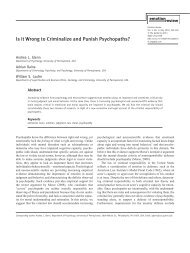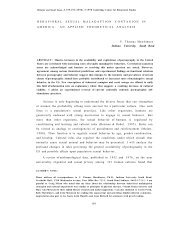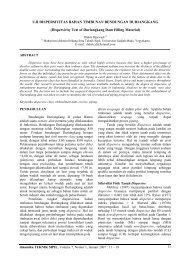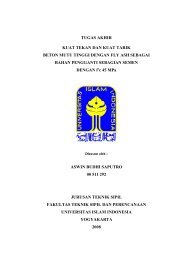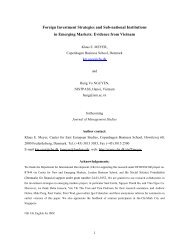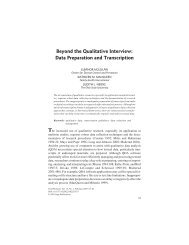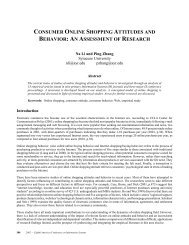Ski – resort and regional development: profile of visitors ... - E-Journal
Ski – resort and regional development: profile of visitors ... - E-Journal
Ski – resort and regional development: profile of visitors ... - E-Journal
You also want an ePaper? Increase the reach of your titles
YUMPU automatically turns print PDFs into web optimized ePapers that Google loves.
14<br />
Carmel Foley <strong>and</strong> Bruce Hayllar<br />
Method<br />
In order to explore the experience <strong>of</strong> the caravan park holiday with long term participants,<br />
we sought to elicit rich information in the form <strong>of</strong> stories, descriptions <strong>and</strong> personal analysis<br />
from the informants. The primary technique for data collection employed in this study was<br />
the in-depth interview.<br />
The purpose <strong>of</strong> the interviews was to identify the ‘attraction’ <strong>of</strong> a caravan park holiday that<br />
kept people coming back to the same holiday park year after year. To this extent, the interview<br />
process was open-ended. However, given the objective <strong>of</strong> the study, the overall framework<br />
sought responses to the following general themes:<br />
• personal histories <strong>of</strong> caravanning <strong>and</strong> camping <strong>and</strong> memories <strong>of</strong> these earlier experiences;<br />
• benefits derived from the contemporary experience, the reasons they return to the same<br />
location on a sustained basis; <strong>and</strong><br />
• the impact <strong>of</strong> the holiday on relationships with family <strong>and</strong> fellow caravan park users,<br />
changes in gender roles, parent-child relationships.<br />
At least one <strong>of</strong> the researchers stayed on-site for the duration <strong>of</strong> the interviewing periods.<br />
The managers <strong>of</strong> the caravan parks assisted with access, introducing the researchers <strong>and</strong> the<br />
purpose <strong>of</strong> the study to the participants. The interviews took place in the caravans, tents <strong>and</strong><br />
cabins <strong>of</strong> the participants <strong>and</strong> were recorded with their permission. Following the interviews,<br />
each <strong>of</strong> the tapes was then transcribed. The data were analysed with the assistance <strong>of</strong> NVIVO<br />
qualitative analysis s<strong>of</strong>tware.<br />
Analysis<br />
The first level <strong>of</strong> analysis undertaken was thematic utilising McMillan’s (1996) four contributing<br />
elements <strong>–</strong> spirit, trust, trade <strong>and</strong> art - as the principal textual groupings. As with any qualitative<br />
study, thematic analysis helps to give a degree <strong>of</strong> order <strong>and</strong> control to the task. This first<br />
‘work’ <strong>of</strong> the data also established some broad groupings <strong>of</strong> experience beyond those emerging<br />
within the McMillan’s (1996) framework. Precise definitions <strong>of</strong> each theme were then<br />
established <strong>and</strong> the data once again examined. At this stage, codes were applied to the data<br />
<strong>and</strong> further reviewed. In order to enhance reliability, each <strong>of</strong> the coded themes (with data<br />
attached) was then reviewed independently <strong>and</strong> then jointly by the research team. Recoding<br />
<strong>and</strong> multiple coding was undertaken to ensure that the nuances <strong>of</strong> the language <strong>and</strong> the context<br />
<strong>of</strong> the data were not lost. Where points <strong>of</strong> difference arose, the original text was reviewed <strong>and</strong><br />
‘worked’ until there was agreement on its thematic placement. Throughout the process,<br />
categories (sub-themes or elements) were also developed to reflect the nuances <strong>of</strong> language<br />
inherent within the more ‘global’ themes.<br />
The <strong>development</strong> <strong>of</strong> themes inevitably involves data reduction <strong>–</strong> the thematic construct is<br />
filtered, disconnected <strong>and</strong> then reconstructed from the text. The processes <strong>of</strong> data reduction<br />
notwithst<strong>and</strong>ing, the themes as developed are interpretive mechanisms, not mutually exclusive<br />
Tourism Today - Fall 2007 - Full Paper



